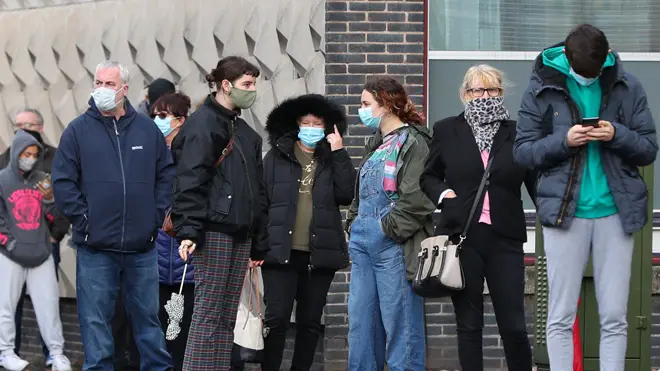
Henry Riley 4am - 7am
9 October 2020, 05:41

The Government is reportedly considering plans to tell vulnerable people living in coronavirus hotspots to go back to shielding this winter.
It could be part of a new three-tier local lockdown system due to be outlined next week.
More than 2 million people in England were asked to shield at the height of the pandemic.
A decision on shielding has not been finalised and may be delayed because of fears for the mental health of those told to avoid seeing other people.
Read more: Show us the science and proof before imposing yet more rules
Around 2.2 million people in England deemed "clinically extremely vulnerable" were asked to shield at the height of the coronavirus pandemic, before the scheme was "paused" in July.

Robert Jenrick: Local lockdowns 'haven't given results we would have wanted'
The report comes amid calls for the Government to take swift action to curb the spread of the virus, after a further 17,540 lab-confirmed cases were reported on Thursday.
Professor John Edmunds, a member of the Government's Scientific Advisory Group for Emergencies (Sage), said coronavirus was "holding a gun" to Boris Johnson's head over the restrictions being introduced, adding that the nation faces an anxious wait to see the full impact on the NHS.
He said: "In the north of England now, we are not that far away from the health service being stretched.
"Because even if we turn the epidemic around now, infections that occur today won't go to hospital for another week or two."
Dr Stephen Griffin, associate professor in the School of Medicine at the University of Leeds, said the increase in cases should "serve as a warning to the Government to take further action without delay".
"It is clear that the consequences of not suppressing infections sufficiently over the summer may be severe if we cannot get on top of this increase," he said.
MPs representing constituencies in the Midlands and north of England - where case numbers are highest - were briefed by the chief scientific adviser Professor Chris Whitty on Thursday.
One of those who joined the call said it was implied that the NHS may not cope if case numbers continued to rise in the areas.
The Government is reportedly planning to order the temporary closure of pubs, bars and restaurants in coronavirus hotspots, with ministers considering fresh financial packages to help the hardest hit areas and industries.
Regional leaders have criticised the Government for not consulting them ahead of changes, while Greater Manchester mayor Andy Burnham said he would challenge any closures.
"I will use whatever means I can to challenge it to get support for people because otherwise they are going to suffer real hardship this winter - we are going to see businesses failing," he told BBC Question Time.
Nottingham council leader David Mellen said delays on implementing restrictions were placing "an unnecessarily huge burden on local resources" as statistics showed the city has the highest Covid-19 rate in England - from 112.3 cases per 100,000 to 689.1 per 100,000 in the seven days leading up to October 5.
On Thursday, news emerged that the city would learn what restrictions would be imposed on Monday - sparking a fear from the council that people would think the weekend "is the last chance before Christmas" to have a party.
Labour leader Sir Keir Starmer, writing in the Daily Telegraph, said the Government had "lost control of the virus" and urged ministers to "get a grip".
He wrote: "It was an act of gross irresponsibility for anonymous Number 10 sources to tell a few newspapers on Thursday about plans to impose further restrictions on millions of people, without any detail, without any consultation and without any statement from the Prime Minister.
"This has significantly added to the sense of confusion, chaos and unfairness in the approach that is being taken."
Meanwhile, the Royal College of Anaesthetists (RCoA) and the Faculty of Intensive Care Medicine said a "worrying" rise in coronavirus patients being admitted to hospital is putting pressure on intensive care units which could lead to a further surge in surgical waiting lists.
NHS England data published on Thursday showed the number of people waiting more than a year to start hospital treatment is at its highest level since 2008 - with some 111,026 people waiting more than 52 weeks to start hospital treatment in August.
It comes as tough new restrictions introduced for Scotland's pubs, bars, restaurants and cafes come into effect from 6pm on Friday.
Across most of the country venues will only be allowed to operate indoors between 6am and 6pm and not serve alcohol, but they will be able to sell drinks until 10pm in outside areas.
However, pubs and licensed restaurants in five health board areas across the central belt will be forced to close for 16 days as of Friday evening.
Establishments in Greater Glasgow and Clyde, Lanarkshire, Ayrshire and Arran, Lothian, and Forth Valley can only provide takeaways during this time with the temporary measures set to end on October 25.